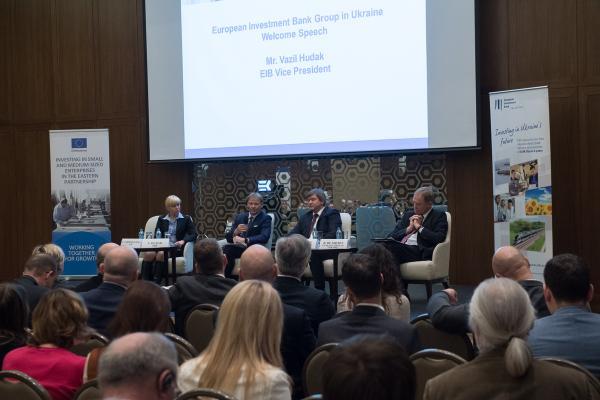
An EU-backed programme enabling the European Investment Bank to support small and medium-sized enterprises (SMEs) in Ukraine and other countries that have signed an Association Agreement with the Union was launched in Kyiv today.
The goal of the Deep and Comprehensive Free Trade Agreement (DCFTA) Initiative East is to strengthen economic development in the target countries by providing financial and technical support to SMEs.
The EIB Group has joined forces with the EU’s Neighbourhood Investment Facility (NIF) to provide a comprehensive package of instruments designed to help companies in Ukraine, Moldova and Georgia make the most of the opportunities arising from the implementation of their free trade agreements with the EU, which involve the progressive removal of barriers to trade and the alignment of standards with those of the EU.
The EU contribution forms part of the European Commission’s wider EU4Business initiative, which brings together EU-funded programmes supporting SME development and improving the business environment in the Eastern Partnership region.
“The private sector drives growth and generates new employment opportunities in Ukraine. The new EU initiative should further strengthen this segment of the national economy,” said EIB Vice-President Vazil Hudák, chairing a conference to inform various stakeholders in Ukraine about access to finance from the EU bank.
The EU bank helps private clients access finance via financial intermediaries by offering improved lending terms and conditions; furthermore, it will enable local banks to take on more risk to reach out to underserved segments of the economy through risk-sharing instruments and advisory services.
Other keynote speakers at the conference included Berend de Groot, Head of Cooperation, EU Delegation to Ukraine, and Oleksandr Danylyuk, Minister of Finance of Ukraine. “A stabilised and growing, stronger economy with strong and healthy SMEs is the cornerstone of a prosperous Ukraine and the new EU4Business DCFTA Initiative East will have a significant role in making this dream come true in the coming years,” said Berend de Groot.
The event was attended by CEOs, CFOs and top management of SMEs and mid-sized companies as well as financial intermediaries, financial advisors and industry associations.
Background information:
The EIB – the EU bank – finances projects in Ukraine on the basis of an EU mandate for the countries of the Eastern Neighbourhood, the so-called External Lending Mandate (ELM). The 2014-2020 ELM provides for a total amount of Bank financing in the Eastern Neighbourhood of EUR 4.8bn to support projects of significant interest to both the EU and its Eastern Neighbours in the areas of local private sector development, social and economic infrastructure and climate change. In addition, the Bank has set up a EUR 3bn own-risk Neighbourhood Finance Facility to enhance its support for the Neighbourhood Countries.
Supporting the effort to strengthen economic development and better diversify the economies of the Eastern Partnership countries that decided to deepen their association and integration with the European Union, in December 2016 the European Investment Bank and the European Commission signed the Delegation Agreement for the DCFTA (Deep and Comprehensive Free Trade Area between the EU and Ukraine, Georgia and Moldova). The Delegation Agreement foresees the provision of EUR 2.8m for risk capital operations, EUR 7.8m for technical assistance and EUR 49.7m for guarantees through the EIB and the European Investment Fund. The implementation of the agreement will start immediately and run until December 2021.
Since the beginning of 2016 all EU activities that support small and medium-sized enterprises (SMEs) in the Eastern Partnership countries have come under the umbrella of EU4Business.
EU4Business provides:
- Support to national authorities, helping to change and improve laws and regulations, building a better regulatory framework to improve investor confidence;
- Support to Business Support Organisations (BSOs) as membership organisations enable a dialogue between government and business. EU4Business can organise PPD (Public-Private Dialogue), co-operation and networking;
- Direct support to small and medium-sized enterprises (SMEs), for example by providing finance, training, coaching and advice, import and export support and matchmaking.


